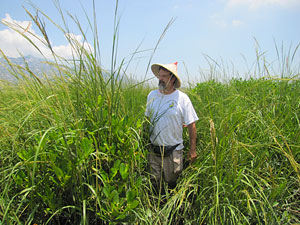Exploring Potential Collaborations with Chinese Wetland Research Groups

Pennings in stands of invasive Spartina alterniflora with scattered mangroves in Zhangjiang Estuary, southern China.
UH professor of biology and biochemistry, Steven Pennings, and postdoctoral fellow, Hongyu Guo, visited China for two weeks in August to explore potential collaborations with well-known wetland research groups in three Chinese cities. Also traveling with the group were Dr. Chris Craft, Ellen Herbert and John Marton from Indiana University.
The U.S. group was hosted by leading Chinese scientists, including Drs. Yihui Zhang (Xiamen University), Guanghui Lin (Tsinghua University), Baoshan Cui, Junhong Bai and Xiaowen Li (Beijing Normal University), Xiuzhen Li (East China Normal University), and Bo Li (Fudan University). Chinese graduate students Yanlong He (East China Normal University) and Qiang He (Shanghai Jiao Tong University) also played a major role as local guides.
At each location, Pennings and Craft gave scientific and career development lectures, and interacted with Chinese faculty and graduate students about their research projects.
The U.S. visitors traveled to mangrove forests in the Zhangjiang Estuary near Xiamen and to tidal marshes of the Yellow River delta near Dong Ying (southeast of Beijing) and on Chongming Island (near Shanghai). These areas gave the group an appreciation for the variation in coastal wetlands across a wide range of the Chinese coast.
Pennings noted that of particular interest were the stands of exotic Spartina alterniflora (native to the United States) at all three locations, the rapidly growing deltaic
wetlands at the mouths of the Yellow and Yangtze Rivers, the high levels of aquaculture
and fishing affecting Chinese estuaries and wetlands, and efforts to restore wetlands
in these regions.
“The Chinese hosts provided extraordinary hospitality to us,” Pennings said. “The
trip was very productive, and researchers from both countries are eager to pursue
additional steps to expand the initial contacts into full-fledged research collaborations.”
The U.S. travelers thank the National Science Foundation for funding an international travel supplement to the Georgia Coastal Ecosystems Long-Term Ecological Research program, and their Chinese hosts for covering many expenses within China.